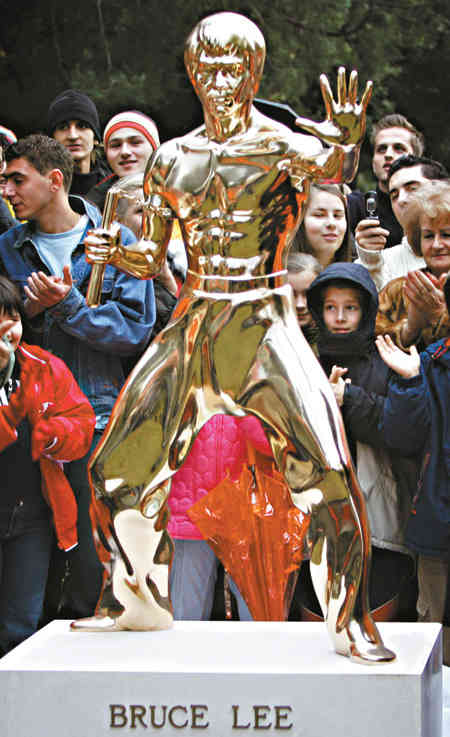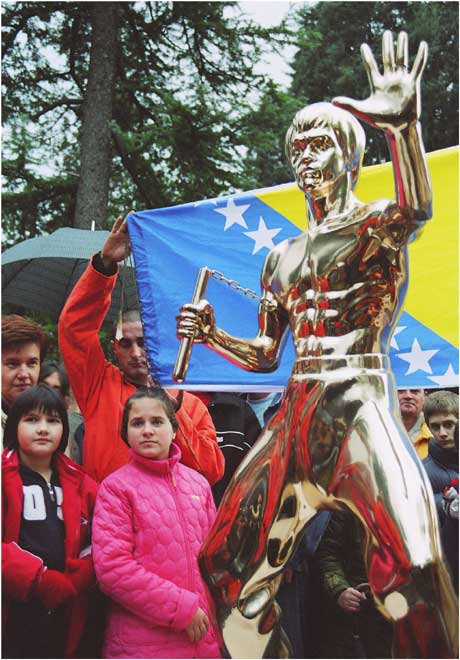A Slower Legacy for Bruce Lee in Chinese Ancestral Town
2010-03-27
Bruce Lee is renowned as a martial arts legend with a slew of action flicks to his name.
A man looks at a poster featuring an illustration of Bruce Lee outside a "Bruce Lee Paradise" park in the township of Xiacun in China's southern Guangdong province March 18, 2010.
[Photo: Agencies]
In the sleepy town of Xiacun in southern China, elders doze and children play along "little dragon" alley, which winds its way to the ancestral home of kung fu star Bruce Lee.
The small, grey-brick courtyard house contains old photos of Lee on the walls, an altar, a musty bedroom and a wooden dummy used for martial arts training, but visitors are few and far between, and other efforts by the town's council to commemorate their most famous son are also off the tourist radar.
While Lee is renowned the world over as a martial arts legend with a slew of action flicks to his name, back in his father's Chinese hometown, where many share the Lee name, his legacy remains low-key, even in 2010, the 70th anniversary of his birth.
"We don't really think about it that much," said a young woman sitting on the threshold of a home next door.
Local officials, however, have been trying to change that.
Millions have been invested in a park filled with lakes and rare birds, and called Bruce Lee Paradise, that authorities in Shunde and nearby Foshan hope will become a major tourist draw.
"Lee's image and reputation are becoming more and more familiar now in Foshan," said Chen Xian, the administration manager of Bruce Lee Paradise. "The Bruce Lee brand is something we've been trying actively to promote ... he's someone the Chinese people should be proud of."
The motivation is part cultural, part commercial. But the park, nearly 90 minutes by car from Guangzhou along dusty highways, remains largely off the beaten tourist track.
During a recent visit, a 12-meter (39 ft 4.4 in) high bronze statue of Lee remained half-finished and under scaffolding. A museum filled with Lee's weapons, books, posters and other memorabilia was virtually deserted.
While Lee was been born and raised in San Francisco, later forging his movie career in Hong Kong, Lee's family originates from Shunde, one of several southern Chinese towns that were home to much of the Chinese diaspora that immigrated in the late 1800s and early 1900s.
While popular overseas, restrictions on Western cultural imports during China's Cultural Revolution meant Lee was unknown inside China during his cinematic heyday in the late 60s and 70s.
Chairman Mao Zedong, is said to have been a fan, according to Chen of Bruce Lee paradise, who says Mao once requested a screen reel of Lee's hit film "Fist of Fury" for private viewing in Beijing.
A gardener walks near the legs of a twelve-metre high bronze statue of Bruce Lee under scaffolding at a "Bruce Lee Paradise" park in the township of Xiacun in China's southern Guangdong province March 18, 2010.
A placard is seen outside the ancestor's house of Bruce Lee in the township of Xiacun in China's southern Guangdong province March 18, 2010.


















